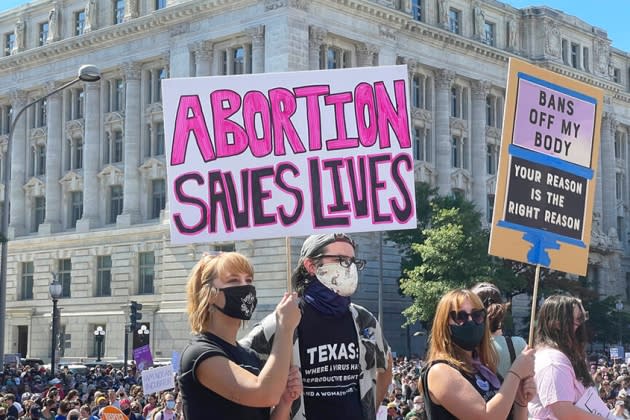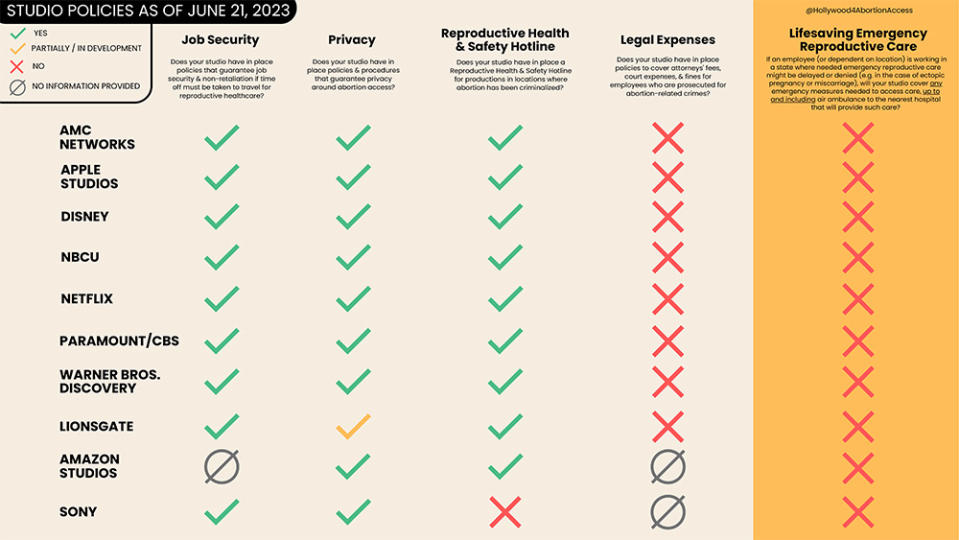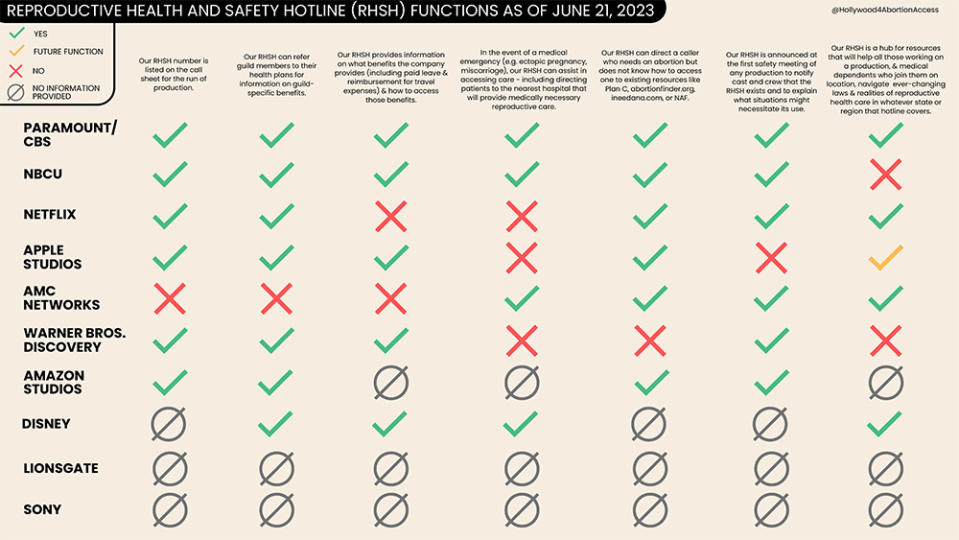Paramount/CBS Leads Studios in Abortion Protection Protocols for Sets, Report Says (EXCLUSIVE)

With the one-year anniversary of Dobbs v. Jackson approaching on June 24, the Showrunners for Abortion Rights — the coalition of showrunners, TV creators and directors that formed in the wake of the Supreme Court’s decision to overturn of Roe v. Wade — has reemerged with a report card that gives an update on their work with the studios. The chart reveals how the 10 major Hollywood studios have responded to the group’s demands for abortion safety protocols for productions in states where abortion has been banned and criminalized. A second slide evaluates the effectiveness of the reproductive health and safety hotlines that was one of the group’s suggestions.
The report — displayed here, along with a new statement from the coalition — reveals mixed results. Several studios, with Paramount/CBS leading the charge, have made strides in protecting the safety of pregnant workers over the past 10 months since this work began. Others have made incremental changes, and are working toward doing more. With lives potentially at stake, though, the coaliation would like the studios to move more quickly.
More from Variety
Showrunners Group Pressures Studios to Put 'Thought Into Action' on Abortion in New Ad
Lionsgate Will Mandate Abortion Safety Protocols for Employees, CEO Says in Memo (EXCLUSIVE)


To illustrate that urgency, Showrunners for Abortion Rights has called for a picket on June 23, alongside fellow WGA members outside of the Los Angeles headquarters of Amazon Studios.
“This demonstration coincides with the one-year anniversary of the landmark Dobbs decision,” reads the new statement from the coalition (included in full at the bottom). As well as picketing, there will be abortion-focused speakers and other programming at the event. The group also states that after the writers strike concludes, its members will continue to pressure the “studios to rise to the occasion of saving people’s lives in the same way they rose to protect all workers’ lives during Covid.”
When the then-unnamed group last issued a public statement, it was in late September, to thank the studios for “for fully engaging and being thought leaders with us.” After that, members of the coalition set about doing the job at hand, working with representatives from the companies. As a whole, the group sees the questions surrounding abortion safety protocols not only in terms of potential medical emergencies from pregnancy complications, but one of gender discrimination.
In an interview with three showrunners from the coalition — who agreed to speak anonymously — they described how the group has worked with the studios, and why production post-Dobbs has become so fraught. “This creates a world where you have a very different set of considerations if you’re thinking about taking a job in Georgia and you’re pregnant, or could become pregnant,” one of the showrunners said. “Your life and your ability to bear children is on the line in a way it just isn’t for a man.”
On that point, though — that women may decide to opt out of working in a forced-birth state — the group has stopped short of calling for boycotts of those states. When asked whether that could happen in the future, one of the showrunners interviewed said it’s a complicated question — especially for creators who’ve worked in states like Georgia with crews they love. “That’s such a tricky issue for our coalition,” she said. “There’s a lot of people that feel ready to say that until and unless you can make it safe, the company should consider whether they need to divert from these areas.”
“We’ve always been divided on that,” she added.
The Showrunners for Abortion Rights — which includes top creators such as Shonda Rhimes, Rachel Bloom and Marta Kauffman — first came together after Dobbs in order to demand that safety protections be put in place for casts and crews in states where abortion has been banned.
On July 28 last year, Variety exclusively reported the coalition’s first letter, signed by 411 showrunners, which was sent to the presidents, CEOs and board members of Netflix, Disney, Warner Bros. Discovery, NBC Universal, Apple, Paramount/CBS, Lionsgate, Amazon and AMC. (Sony was included later.) In the letter, the showrunners demanded new systems be put in place for safe, funded and private travel for any employee seeking an abortion; they wanted protocols for care for “ectopic pregnancies and other pregnancy complications” during production; and they said they need safeguards “regarding criminal and civil legal protection” for those who help an employee get an abortion.
Then, Aug. 1, a letter from 594 male showrunners — including Ryan Murphy, Jordan Peele and J.J. Abrams — replied-all to those letters, saying they stood with their “female, trans & non-binary showrunner colleagues in demanding a response from our employers regarding the imminent crisis.”
After directors signed on as well, the coalition grew to more than 1,500 creators.
The initial response from the studios, issued through the Motion Picture Association, was, according to anonymous members of the coalition in an interview last summer with Variety, “patronizing,” and didn’t give specifics about how they would handle any imminent health crises on sets. In a statement issued on Sept. 9, the coalition noted that several studios were open to their proposal of a “24-hour Reproductive Health Safety Hotline for productions in abortion-hostile states.”
Ten months later, according to the report card, nine of the 10 studios now do have a hotline for reproductive safety. Most of them, the showrunners said, offer a range of resources from advising what benefits are available to being able to tell an employee where to go in the event of a pregnancy emergency. According to the coalition’s data, only Sony doesn’t have a dedicated hotline, though it does have a general healthcare hotline. (A representative from Sony declined to comment.)
The data process clearly isn’t perfect, though. Variety asked one studio that seemingly hadn’t provided any information to the group for comment on June 20 — and it turned out there had been some miscommunication with the coalition, or it had gotten lost. The coalition then quickly updated the report card.
Generally, though, since work with the individual studios began in earnest in September, the members of Showrunners for Abortion Rights developed a process. It’s a leaderless group, but there’s a steering committee of around 40 creators. For each studio, showrunners with overall deals volunteered to be delegates — there were 35 delegates across the 10 studios — who’d work with three members of the steering committee tasked with sharing the information with the larger coalition.
The delegates from Paramount/CBS, for instance, worked directly with Talia Robinson, the company’s EVP of human resources, whom they said went above and beyond to find solutions. Robinson provided an example, the showrunners told Variety, that delegates working with other studios could show their respective workplaces, helping overcome roadblocks. With Paramount/CBS providing a template, “We had a studio proving it could be done,” they said.
The writers strike has mostly put a pause on the coalition’s direct engagement with the studios, though they hope that the companies are continuing to do the work. The next challenge, as one can glean from the right-side columns with the big red “X,” is to work on getting life-saving emergency care, as well as legal protections for anyone who might be prosecuted for any abortion-related procedures. With the second matter, the group is waiting to see what develops legally. “The situation is changing rapidly, and it’s unclear what some states will try to prosecute in the future,” said one showrunner.
It’s the pregnancy emergencies that are top of mind. They said they’ve had to educate the studios that it’s not only a matter of helping an employee seek an abortion in a state where they’re now severely restricted or illegal — though that is, of course, a priority. But employees with wanted pregnancies might have an emergency that causes their lives to be endangered, only to have the safest possible medical remedies blocked by abortion restrictions and bans. “We asked the studios to step up and make our workplaces safe and equitable for everyone working on our productions,” the showrunner said.
Since late June, members of Showrunners for Abortion Rights have been devoting countless volunteer hours to work on solving these problems and making sets safe. And to the studios that haven’t been as receptive to working with them, the showrunners hear that message loud and clear: “Our safety is not as high a priority for them.”
Statement to Accompany Publication of Studio Progress Report Card
Last summer a coalition of showrunners called for new protections on film and television productions shooting in states where abortion is now banned and criminalized. Today we are sharing a report of the progress made by each studio over the past year.
While the studios made some significant changes in response to our demands, and some studios engaged more wholeheartedly than others, the bottom line is: if you are pregnant or could become pregnant, it’s still not safe to work on a production shooting in Georgia, Texas, Alabama, Mississippi, Arkansas, Louisiana, Oklahoma, Tennessee, Kentucky, Missouri, West Virginia, Wisconsin, South Dakota, Idaho, Utah, Nevada, North Dakota, Iowa, Kansas, Indiana, Ohio, South Carolina, or North Carolina.
Imagine you are a camera operator who’s 18 weeks pregnant, with a toddler at home. You’ve worked hard to get to this point in your career and you’re shooting a show for Amazon in Georgia. You go into labor early, and there is no chance your baby will survive. But because you are in Georgia, doctors are afraid to treat you with the standard of care: an immediate D&E procedure to remove the fetus and protect your reproductive organs. You are sent away and told to come back when you’re in danger of dying. Two days later you come back to the ER with severe sepsis. You deliver a deceased fetus and doctors barely save your life, but must do an emergency hysterectomy, meaning you’ll never be able to carry another pregnancy.
Unfortunately we’re hearing new reports of reproductive healthcare denied like this every week in abortion-ban states. It is unconscionable and discriminatory to ask people to choose between their health and safety and their jobs.
Most studios added a reproductive health and safety hotline to their call sheets or start-of-work materials; these hotlines offer a variety of resources. Only the hotline created by Paramount/CBS offers all the functions requested by our coalition. But no studio would commit to protecting workers in the event of prosecution for abortion-related crimes. No studio is currently willing to ensure access to lifesaving emergency reproductive healthcare, but all ten studios we corresponded with are still shooting film and television in abortion-hostile states.
All of us are familiar with what can be accomplished on a film set in just ten days; we hoped the studios would do more in a year of addressing this urgent human rights situation. We find it extraordinary that these mega-corporations will collaborate through the AMPTP when it comes to protecting their profits, but not when it comes to protecting the lives of women and people who can become pregnant.
Following the strike, we will apply further pressure to motivate studios to rise to the occasion of saving people’s lives in the same way they rose to protect all workers’ lives during Covid. Our lives are not a production cost and we cannot accept these dangerous and discriminatory working conditions.
Steering Committee
Showrunners for Abortion Rights
Update: An earlier version of this story said that most of the studios’ hotlines are staffed by medical professionals — only the Paramount/CBS hotline is.
Best of Variety
Sign up for Variety’s Newsletter. For the latest news, follow us on Facebook, Twitter, and Instagram.

